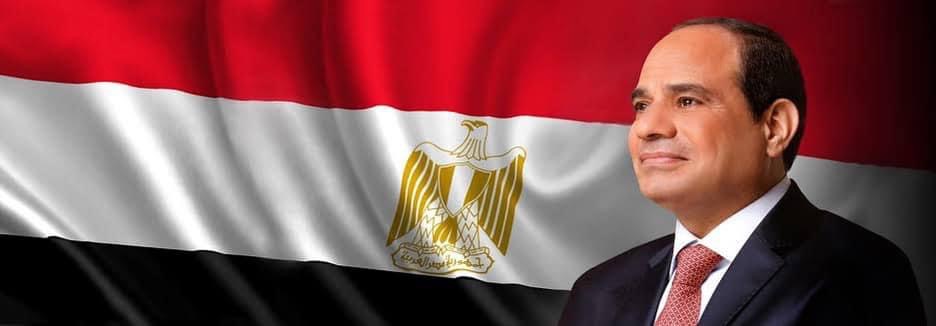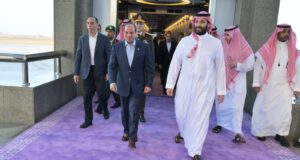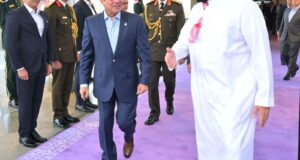Finance Minister conducts an open dialogue with the Higher Council for Media Regulation President Al-Sisi to attend the inauguration of AIIB’s annual meetings in Sharm El-Sheikh

Alhadath – Cairo
Reinforcing partnership with the private sector through creating finance opportunities for development investments
Egypt’s unique location can make it an effective linkbetween the continents of Africa, Asia and Europe
The Higher Council for Media Regulation (HCMR) led by Karam Gabr conducted an open dialogue with Finance Minister and Egypt’s governor to AIIBMohamed Maait. The dialogue focused on Egypt hosting AIIB’s annual meetings on 25-26 September at SharmEl-Sheikh for the first time in Africa. The dialogue was attended by HCMR’s deputy chairman Saleh El-Salehi, HCMR’s board member and TV hostess Rania Hashem, and a number of Finance Ministry’s officials, chief editors of newspapers, online websites, and senior writers. The dialogue was held at HCMR’s headquarters at Maspero in Cairo.
Finance Minister and Egypt’s governor to AIIB Mohamed Maait emphasised that President Abdel-Fattah Al-Sisi would attend the inauguration of AIIB’s annual meetings. He expressed hopes that the meetings will help reinforce partnership between the private sector andAIIB which offers finance for development investments.
Finance Minister Mohamed Maait also stressed the important role the AIIB is playing in creating a link between African and Asian countries (the South countries) through improving their living conditions and contributing to local and international sustainable development. He said AIIB is a financially strong bank and ranked as Triple A, focusing on infrastructure and climate areas as well as encouraging the private sector. AIIB’s 106 members represent 79 per cent of the world’s population and 65 per cent of the world GDP.
Finance Minister indicated that Egypt has joined AIIB as a founding member in 2016 and that AIIB’s capital stands at US$ 100 billion. He noted that Egypt’s subscription to AIIB stands at US$ 650 million and thatthis makes Egypt the largest subscriber to AIIB’s capital in Africa. It has been the first time that AIIB holds its annual meetings in an African state since the breakout of the Covid-19 pandemic in 2019. AIIB provided investments worth US$ 44.4 and approved new investments worth US$ 36.8 billion, and with a total of around US$ 81 billion, with most of it went to the private sector which got finance in 34 countries. In fact, as much as 22 per cent of the private sector’s AIIB-funded projects went to the energy sector, 17 per cent to the transport sector, 15 per cent to multi-sectors, and 4 per cent to the digital and technological sector.
Finance Minister Mohamed Maait noted that the fact that AIIB will be holding its annual meetings in Africa in Egypt for the first time shows that AIIB is giving great importance to Egypt’s unique location and that it is keen to boost its investments in infrastructure in Egypt through partnership with the private sector. Right now Egypt and Canada are having an alternate seat at AIIB’s board. AIIB’s investment portfolio in Egypt stands at US$ 1.3 billion, and that out of this amount, AIIB contributed EUR 250 to the transport sector (the Alexandria-Abu Qir metro line), US$ 210 million to the Benban solar power plant, US$ 350 million to comprehensive growth, and US$ 300 million to the water sector (rural sustainable sanitary drainage services). Egypt is planning to issue panda bonds in the Chinese capital market and AIIB is expected to offer US$ 230 million as guarantee.
Finance Minister Mohamed Maait indicated that a workshop was conducted between AIIB and the Egyptian private sector and that this dialogue was held at the Finance Ministry’s headquarters in Egypt’s Administrative Capital.
He said more workshops will be held on the sidelines of AIIB’s annual meetings as investment in the infrastructure sector takes a priority in all world countries. It is a fact that without robust infrastructure including road and port networks we can’t have investments. It is equally true that investment in infrastructure is costly and huge but it is necessary for the future of development and for creating job opportunities.
Maait stressed that investors are always in need of water, gas and electricity to operate their projects and so we have to provide all of these services because without them there will be no investment. So we are in need of gas, water, electricity and sanitary drainage networks to achieve development and create jobs.
Maait indicated that what has been achieved in recent years in Egypt in the area of building infrastructure, new cities, sanitary drainage networks, tunnels and provision of natural gas to households helps achieve development and creates job opportunities.
He noted that the Egyptian state has pumped huge investments into the area of building and rehabilitating infrastructure and what has been achieved in Egypt in this respect over the past eight years will be remembered in history by the coming generations. These achievements were accomplished despite the economic crises which hit the country in the past few years, including the Covid-19 pandemic, the disruption of supply chains..etc.
Maait also highlighted the fact that achievements in Egypt in recent years were not confined to the area of building new cities, infrastructure and roads, but under the regime of president Abdel-Fattah Al-Sisi the universal health insurance system was launched after it took long years of studies. This system is currently in application in three governorates and more than EGP 87 billion were pumped to ensure its sustainability. It was a dream to provide Egyptian families with health care, and by the year 2023 health insurance in Egypt will be able to cover 120 million citizens.
Maait also remarked that investment in the infrastructure of ports is witnessing great progress. The development and expansion of ports was a necessity to alleviate the congestion of goods and save billions of dollars in losses.
Maait pointed out that the projects of dry ports is one of the areas which could be financed by AIIB, and that these projects could be implemented in partnership with the private sector. The state is keen that the private sector take charge of implementing these projects.
 +00000000
+00000000









